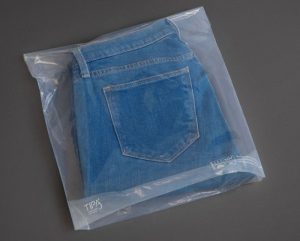 AMSTERDAM — December 13, 2022 — Today, Fashion for Good launches the Home-Compostable Polybag Project, a pilot to test alternatives to conventional single-use polybags. Orchestrated by Fashion for Good in partnership with C&A and Levi Strauss & Co., this six-month project uses novel bags from Fashion for Good innovators TIPA Corp. and Greenhope. These bags are made with bio-based material to lessen fossil fuel consumption and are designed to compost in either home or municipal composting environments. The project aims to find alternative end-of-use for landfill-bound materials, and to provide an at-home option for consumers who do not have access to municipal composting programs.
AMSTERDAM — December 13, 2022 — Today, Fashion for Good launches the Home-Compostable Polybag Project, a pilot to test alternatives to conventional single-use polybags. Orchestrated by Fashion for Good in partnership with C&A and Levi Strauss & Co., this six-month project uses novel bags from Fashion for Good innovators TIPA Corp. and Greenhope. These bags are made with bio-based material to lessen fossil fuel consumption and are designed to compost in either home or municipal composting environments. The project aims to find alternative end-of-use for landfill-bound materials, and to provide an at-home option for consumers who do not have access to municipal composting programs.
Introducing Compostable Alternatives To Landfill-Bound Polybags
An estimated 180 billion polybags are produced every year to store, transport and protect apparel and footwear. Their production, use and end-of-use have a significant impact: conventional virgin polybags have a high carbon footprint and low recycling rates across the globe. Conventional bags are commonly incinerated, landfilled, or subject to environmental leakage, harming natural systems. To change this paradigm, innovation must both find appropriate disposal pathways that are less harmful to the environment and reduce fossil fuel consumption.
In the Home-Compostable Polybag Project, Fashion for Good partners C&A and Levi Strauss & Co. will test key home-compostable polybags that include, bio-based material from innovators TIPA Corp. and Greenhope, in their supply chain as a viable substitute to conventional plastic polybags.
“We are proud to participate in the Home Compostable Polybag Project by Fashion for Good,” said Aleix Busquets Gonzalez, head of Global Sustainability at C&A. “As part of our Sustainability Strategy, C&A has set high ambitions in the reduction of consumer-facing plastic by 2028. This pilot project plays a crucial part in reaching C&A’s plastic reduction goal and contributes significantly to an industry wide transition.”
Scaling Innovtive Plastics
There are several critical challenges to scaling home-compostable bags: functionality, impact, cost and infrastructure, all of which will be assessed over the course of the project. The innovative bags include bio-based content, which must be tested against key performance and quality properties, such as transparency, durability and longevity. This project seeks to benchmark these bags against conventional plastics in supply chains, as well as measuring the overall impact and associated costs of the materials.
“The Home-Compostable,Polybag Project with Fashion for Good is an exciting opportunity to pilot a solution for an ecommerce element our customers are all too familiar with – the polybag,” said Jeffrey Hogue, chief sustainability officer, at Levi Strauss & Co. “This pilot not only moves us toward achieving our goal of eliminating single-use plastic in consumer-facing packaging by 2030, it also puts into practice the industry collaboration required to solve these ubiquitous challenges in hopes of reducing harmful elements within the apparel supply chain.”
Building A Foundation For Circularity
The Home-Compostable Polybag Project is the third Fashion for Good polybag project following the Circular Polybag Pilot (completed in 2020) and Reusable Packaging(completed 2021) projects. These projects aim to validate innovations that reduce the dependence on virgin fossil fuels, reduce impact of production, and are capable of compostability, avoiding landfill.
“Fashion is one of the main segments where consumers are looking for alternatives to conventional plastic packaging,” said Daphna Nissenbaum, CEO and co-founder, TIPA Corp. “This is why we’re extremely proud to be selected by Fashion for Good to take part in this innovative pilot to test plastics that biodegrade into the soil at the end of use. By offering an alternative to conventional plastic packaging, TIPA helps sustainably-responsible fashion brands fight plastic pollution. A programme like this is crucial for demonstrating the viability of compostable packaging like TIPA’s and gaining scale by forming more alliances within the industry.”
“We are so excited to be selected by Fashion for Good to take part in this collaborative project with such credible global parties,” said Tommy Tjiptadjaja, CEO and co-founder, Greenhope. “Plastic waste pollution is a massive systemic issue and this collaborative platform approach is one of the most effective ways to quickly arrive at credible, scaled solutions. Through our technology, Greenhope is ready, willing, and able to support this all the way to its positive conclusion: linking sustainable consumption and production of global brands with positive social impact among developing countries’ farmer coops who provide the bio-based raw materials.”
Posted December 13, 2022
Source: Fashion for Good




